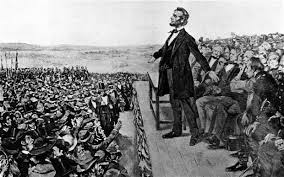 ‘Government of the people, by the people for the people‘. Abraham Lincoln’s Gettysburg Address in 1863 defined governance and human equality as the cornerstone of America’s national purpose; with the essential ingredient being the willingness of the populace to be governed for that purpose. It was no coincidence that this was the same year that slavery was effectively abolished in the US: there can be no legitimate, human governance while slavery still exists.
‘Government of the people, by the people for the people‘. Abraham Lincoln’s Gettysburg Address in 1863 defined governance and human equality as the cornerstone of America’s national purpose; with the essential ingredient being the willingness of the populace to be governed for that purpose. It was no coincidence that this was the same year that slavery was effectively abolished in the US: there can be no legitimate, human governance while slavery still exists.
Yet one particularly dirty, corporate secret is that slavery is much closer to home than most of us would care to admit. Like many companies, Nestlé, which scores a lowly BB+ on the OMINDEX (organizational maturity index) has yet to construct a coherent business model, with effective systems in place, to ensure that its supply chain is completely free of slavery. Not only are Nestlé’s actions the antithesis of good corporate governance, they are also a clear indication of poor human capital management (HCM) capability, underperformance and sub-optimal investment value. While Nestlé’s poor ethics record is a PR disaster it is also a tacit admission that Nestlé cannot achieve great operating margins even with slave labour.
At an Investment Association conference in London last November no one challenged OMS’s contention that Nestlé’s operating margins were 5-10 percentage points behind where they could be, if they seriously addressed the critical human governance issues covered by our standard. This is why human governance has become a very big issue: globalisation has made the stakes so incredibly high that companies can no longer afford to pay lip service to the demands of responsible investing. The real irony here though is the failure to recognise that the most mature organizations build their business models and practices around a core of enlightened human governance, which prove to be the most sustainable way of producing the highest, long-term value and wealth for all.
The Maturity Institute sees all corporate governance issues, particularly human governance, as a whole system problem that requires a whole system solution. That is why OMS LLP (approved by MI) has launched its OM30 as a minimum reporting standard to cover all of the essential ingredients that, together, reassure not only investors but wider society that all is well from a human governance perspective.
There is nothing to fear in answering the questions in the OM30 and everything to gain. We aim to make it the most workable and widely accepted standard for indicating organisational health and long-term value creation. We are already in dialogue with a range of influential stakeholders and look forward to our human governance standard becoming fundamental to responsible investment; such as through listing requirements for stock exchanges, underpinning regulatory guidelines and receiving widespread support from investors. Companies are also contacting us to see how they “measure up”: we encourage all companies who believe in responsible management to do the same.
Comments are closed